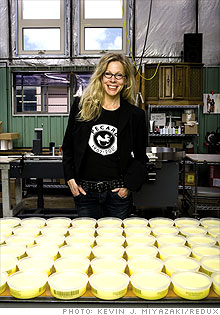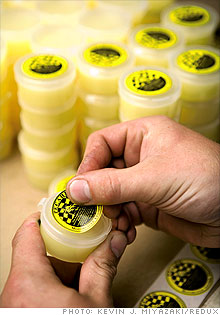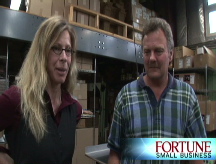Running a business after the leader dies
Tragedy forces change on a growing family business.
 |
| A NEW ROLE: Michelle Wadzinski, with leather dressings, inherited her late husband's firm. |
 |
| The labels for Pecard's motorcycle-leather dressings are applied by hand. |
GREEN BAY, WIS. (Fortune Small Business) -- The past couple of years haven't been easy for Michelle Wadzinski and her brother-in-law Phil Wadzinski. In 2006, Michelle's husband and Phil's brother, Steve, was killed in a motorcycle accident. Within days of his death the pair found themselves running Steve's business, Pecard Chemical, a manufacturer of leather-care products that dates back to 1902 and has been in the family since the 1950s.
"I took over a company I knew very little about," says Michelle, 40.
She was shocked to inherit 100% of the business. The mother of three, who left her pharmaceutical sales career to become president of Pecard, had only briefly discussed succession planning with Steve. Phil, formerly plant manager at the four-employee firm, became vice president. Though he lacks equity in Pecard, his commitment to its success matches that of any owner. Recalling how hard his father and Steve worked to build the firm, he is determined to honor their efforts.
Nevertheless, Phil's new role doesn't come easily to him. "The office was my brother's realm," he says.
Fortunately Steve kept detailed client notes, which helped steady the business after his death. Total sales of private-label and Pecard-branded oils and lotions have grown about 8% a year since 2005 and topped $1 million in 2007. But all does not run smoothly.
"We have to learn to work together," says Phil, 50. Cooperation between Phil, Michelle, and their office manager is spotty. Failing to keep one another informed has led to blunders. Ever the ambitious seller, Michelle has made promises to clients without consulting Phil, who would then break the news that the firm couldn't deliver. Fights have ensued, filling the Pecard office with tension.
Gathering the experts
One thing Phil and Michelle share is a desire to grow the company. Manufacturing for 14 private labels, such as Red Wing Shoe, makes up 75% of Pecard's sales. The rest comes from Pecard-branded oils and lotions, which are sold through distributors and retailers as well as on a newly relaunched website. Production could easily increase - Pecard's four-valve filling machine, for example, is rarely set to produce its full output of 6,000 eight-ounce bottles a day - but the in-laws are unsure of how best to proceed.
"We feel stuck," says Phil.
To help unblock them, Fortune Small Business gathered three experts.
The first to arrive is Thom Cody of Pathmakers, a family-business consulting firm based in Oneida, Wis. After a brief factory tour, we settle in a small office. Michelle immediately voices doubts about her role at Pecard.
"I feel my position isn't rightfully earned, and I wonder what I bring to the table," she says. Phil quickly praises Michelle's sales skills, but Cody worries that her insecurity could limit Pecard - especially if she censors her ideas. "How often do you two discuss company issues?" he asks. "We're not very good at that," Phil admits.
Cody, 42, advises them to build communication into their routine. "Have lunch together weekly," he says. "Talk about progress made on individual projects as well as company goals."
It's also crucial that Michelle and Phil define their respective managerial roles at Pecard. Phil clearly understands the firm's manufacturing operations, and Michelle excels at sales, but Cody suggests that they usepsychological profiling tests such as the Myers-Briggs Type Indicator to get an overview of their managerial strengths and weaknesses.
Cody also asks Phil and Michelle whether they have worked out a succession plan. "We haven't crossed that bridge yet," Phil replies. Given their history, they know they should.
Don't delay, insists Cody. He also suggests that they take out a key-person life insurance policy on each other, which Steve didn't have. Key-person policies can cover costs such as hiring interim staff. And in a small business, "the loss isn't just the person, it's their client relationships," says Cody. "It allows you some breathing room."
Phil, who misses the business counsel of his late father and brother, admits to sleepless nights worrying about Pecard's survival. To ease the stress, Cody recommends that Michelle and Phil set up an outside advisory board. Keys to a successful board: Decide what you want the board to provide - advice, business contacts, credibility, or all three. Consider asking a customer to join, and be sure to define the areas of expertise you need board members to possess, such as finance, production, or marketing.
Building the brand
Next up is Rick Bakosh, 48, managing partner in the Chicago office of Accenture (ACN), a global consulting firm. He's here to discuss Pecard's plan to grow both its private-label business and its own brand.
Bakosh notes that building a brand can be pricey. Marketing, invoicing, and getting paid for branded products will cost more than doing the same for a few big private-label clients that yield larger sales volume per account. Put bluntly, the Pecard line is unlikely to be the firm's most lucrative. "Manage your limited resources effectively," Bakosh suggests.
Next he asks what makes Pecard attractive to private-label clients.
That's easy, Phil explains: Unlike many of its rivals, the firm is known for its ability to change orders on a day's notice and deliver next week's order tomorrow. "Terrific!" Bakosh exclaims. He urges Phil and Michelle to be just as responsive when it comes to creating products to treat new leather and synthetic materials. Says Bakosh: "Build partnerships with them to get ahead of their product development."
But Phil and Michelle don't want to ditch the Pecard brand entirely. So Bakosh suggests that they market their own brands more efficiently. Instead of targeting retailers directly, as Pecard has for the past two years, he urges them to focus on attracting more distributors. Pecard has been selling to 157 retailers but works with fewer than ten distributors.
"Given your size, it's hard to win over hundreds of thousands of U.S. retailers. That's why distributors exist," he says. The trade-off? Lower profits, because Pecard will have to offer attractive commissions.
The third expert to visit the factory is Deborah Mitchell, 49, senior marketing lecturer at the Wisconsin School of Business in Madison. Mitchell promptly requests a description of Pecard's product features. Phil and Michelle proudly list them: a rich history of unique formulas that date back more than a century, natural ingredients, and unmatched quality.
Mitchell says she is impressed by the firm's longevity. "Find out how many other companies in the state and country have been around that long," she urges. If Pecard is one of Wisconsin's oldest firms, as she suspects, that fact could be a great marketing tool.
She is curious about the Pecard brand. Phil and Michelle say their products appeal to consumers who want long-lasting leather goods and those who hope to keep high-quality leather looking pristine. Mitchell asks Phil and Michelle to consider where such customers might shop. Find a retailer that echoes Pecard's values, she says, stressing that Wal-Mart (WMT, Fortune 500) and Target (TGT, Fortune 500) probably aren't good fits. Michelle is bursting with ideas, ranging from cooperative grocery stores to Restoration Hardware, a high-end home-furnishings chain.
Next, Mitchell inquires about Pecard's customer service. Customers often call or e-mail asking for advice on caring for their leather.
"We make every effort to respond," says Phil. "If we don't have a ready answer, we'll do research to get it." Great, Mitchell says: Phil and Michelle should position themselves as national leather experts. They should start by contacting radio stations, newspapers, and TV shows such as PBS's Antiques Roadshow. All their marketing material should stress that they offer tradition, expert knowledge, and great products.
A few weeks later Phil and Michelle are still buzzing from their Makeover. "It was great to hear outside perspectives," says Michelle.
Phil plans to expand the website's frequently-asked-questions page to include more leather-care advice. Communication has greatly improved between the in-laws: They now copy each other on e-mails and have had a series of strategic talks about Pecard's future. Michelle plans to do the same with her other employees.
"We have different styles for reaching a common goal," says Phil. "We'll be fine. It's just a matter of keeping the lines of communication open." We'll report back on whether they continue the good work. ![]()
Newman's Own: Preparing for life after Paul
Family businesses fight long odds to become legacies
iReport: How's your business faring? How are the economic pressures affecting your business? Are you making fewer sales? Doing less advertising? Working longer hours? Send your photos and videos, and they could be profiled in an upcoming CNNMoney.com story.
-
The Cheesecake Factory created smaller portions to survive the downturn. Play
-
A breeder of award-winning marijuana seeds is following the money and heading to the U.S. More
-
Most small businesses die within five years, but Amish businesses have a survival rate north of 90%. More
-
The 10 most popular franchise brands over the past decade -- and their failure rates. More
-
These firms are the last left in America making iconic products now in their twilight. More









